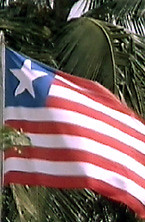The Story of Liberia
I am presently serving in Liberia, W. Africa. Mercy Ships has committed to work here until early Summer 2006.
Liberia has a rich history and the only W. African country with such a strong connection to the United States. The flag of Liberia, pictured on the right, is a good indication.
"The present-day Republic of Liberia occupies 43,000 square miles (slightly more than Tennessee) in West Africa. It is bordered on the southwest by the Atlantic Ocean and surrounded by Guinea, Sierra Leone, and the Ivory Coast. From antiquity through the 1700s, many ethnic groups from the surrounding regions settled in the area, making Liberia one of Africa's most culturally rich and diverse countries. Settled in the early 1800s by freeborn Blacks and former slaves from America, Liberia, whose name means "land of freedom," has always struggled with its double cultural heritage: that of the settlers and of the indigenous Africans."
"In 1816, a group made up mostly of Quakers and slaveholders in Washington, D.C., formed the American Colonization Society (ACS). The Quakers opposed slavery, and the slaveholders opposed the freedom of Blacks, but they agreed on one thing: that Black Americans should be repatriated to Africa. The Quakers felt that freeborn Blacks and former slaves would face better chances for freedom in Africa than in the United States. They also saw repatriation as a way of spreading Christianity through Africa. The slaveholders' motives were less charitable: They viewed repatriation of Blacks as a way of avoiding a slave rebellion like the one that had taken place on the island of Santo Domingo, today's Haiti."
"Despite opposition from many Blacks and from white abolitonists, the repatriation program, funded by ACS member subscriptions and a number of state legislatures, moved forward. In 1822, the first 86 voluntary, Black emigrants landed on Cape Montserrado, on what was then known as the Grain Coast. They arrived with white agents of the ACS who would govern them for many years. Many others followed, settling on land sometimes purchased, sometimes obtained more forcefully, from indigenous chiefs."
"In 1824, the settlement was named Monrovia, after the American president (and ACS member) James Monroe, and the colony became the Republic of Liberia. Over the next 40 years, 19,000 African American repatriates, sometimes known as Americo-Liberians, settled in Liberia, along with some 5,000 Africans recaptured from slave ships, and a small number of West Indian immigrants."
To read the rest of the story of Liberia's history, click here.



0 Comments:
Post a Comment
<< Home